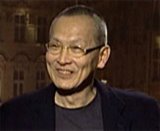- Home
- Wayne Wang
Wayne Wang

WAYNE WANG
Date of Birth: January 12, 1949
Wayne Wang was born in Hong Kong, but because his father loved American movies, he named his son after his avorite actor, John Wayne. Wang inherited his father's love of film and traveled to the States to study film and television at California's College of Arts and Crafts in Oakland. He returned to his homeland after graduation to gain experience working in television and film, then, back in the States, he settled in the San Francisco area and obtained grants from the American Film Institute and the National Endowment for the Arts to direct, produce and co-write his first feature, Chan Is Missing (1982), set in San Francisco's Chinatown. In 1984, he directed his second feature, Dim Sum: A Little Bit of Heart, which focused on a mother/daughter relationship, again set in San Francisco. His next film, Slamdance (1987), was his first film not to feature an Asian theme.
Eat a Bowl of Tea (1989) was a romantic comedy again set in Chinatown, while Life Is Cheap . But Toilet Paper is Expensive (1990) was an experimental film that received no rating in the U.S. due to several graphic, blood-soaked scenes.
Wang fared much better with the critics and the moviegoing public with his next film, The Joy Luck Club (1993), based on the best-selling novel by Amy Tan. The movie did well at the box office, and Wang managed to attract big names such as Harvey Keitel and William Hurt to star in his next film, Smoke (1995), about a Brooklyn smoke shop and the characters who frequent the store. Made on a relatively small budget, the film only managed to break even. Despite the lack of box office success, he made a follow-up film, Blue in the Face (1995) that attracted stars such as Michael J. Fox, Madonna, Lily Tomlin and Lou Reed, but this time, the film was a flop that didn't even make its money back.
Wang moved on to Chinese Box (1997), starring Jeremy Irons and Gong Li. The film deals with the transition of Hong Kong from British rule back to Chinese control. It was not well received by critics or by the public.
He returned to mainstream films with Anywhere But Here (1999), starring Susan Sarandon and Natalie Portman. The story, about a mother and daughter, touched audiences and was an instant success.
In the meantime, through an association with several successful dot.com businessmen, Wang became fascinated with pornography and made several trips to strip clubs. From his experiences, he wrote the screenplay for The Center of the World (2001), about a dot.com millionaire and his association with a lap dancer. Of the movie, which he also directed, Wang said, ".it's almost like sex is something that nobody wants to deal with in an explicit way.. Nobody is doing it. At the same time pornography is going wild. Yet serious movies are not dealing with it." He asked his leading actors, Molly Parker and Peter Sarsgaard, to actually engage in sex during filming of the movie, but they flatly refused. He finally had to give in when he saw the rehearsals, deciding that the portrayal was realistic enough after all. His attempt to combine pornography with a serious feature film met with scorn and he was depressed and angered by the reaction of critics and the public alike.
Wang decided to go mainstream for his next flick, Maid in Manhattan (2002), directing Jennifer Lopez and Ralph Fiennes in the Cinderella-like story of a wealthy man who falls for a hotel maid thinking she's a socialite.
Wang is married to actress Cora Niao, who has appeared in several of his films, including Dim Sum, Eat a Bowl of Tea and Life Is Cheap . But Toilet Paper is Expensive.